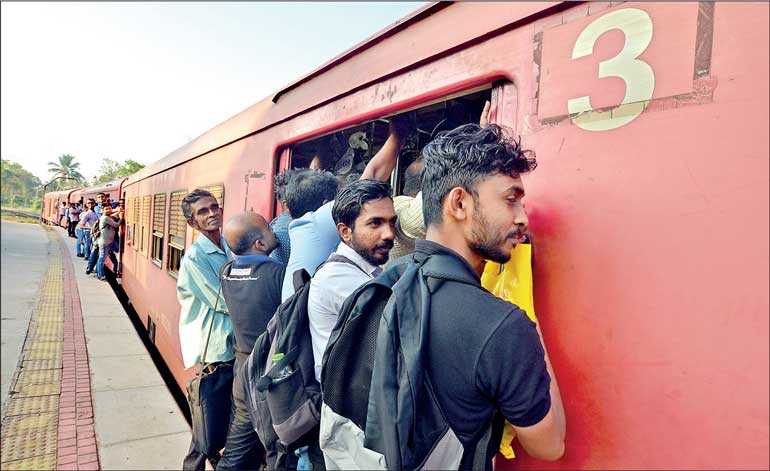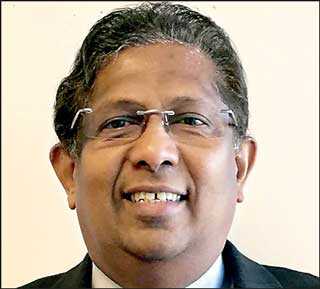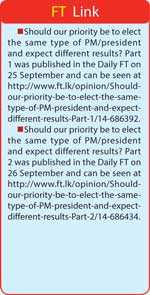Sunday Feb 22, 2026
Sunday Feb 22, 2026
Friday, 27 September 2019 00:00 - - {{hitsCtrl.values.hits}}

By Anura K. T. De Silva
Separation of powers
The idea that a just and fair government must divide power between various branches did not originate in recent times but has deep philosophical and historical roots in Europe. It began with the Legislature and the Judiciary being answerable to the Monarchy. But as people became more independent and democracy became predominant, ideas about separation of powers became foundational to a well-functioning government. 
Centuries later, when the exercise of absolute power, especially in a cruel and oppressive way, was accepted as the primary threat to any government, the best way to prevent such excessive power was considered through separation of powers, in which different bodies of government exercised Legislative, Executive and Judicial power, with all these bodies subject to the rule of law.
Checks and balances
As James Madison once wrote: “If men were angels, no government would be necessary,” emphasising on the necessity for checks and balances and a government which is responsible to be administered by a few citizens over many citizens.
Hence, the great challenge is to first transfer and enable the necessary powers to the people to control those we elect to govern and introduce necessary processes for self-control, contrary to the excessive and unquestionable powers we currently grant to those we elect while eradicating the powers of the people once they elect representatives.
Therefore, in addition to the separation of powers, we need to build a system of checks and balances designed to guard against tyranny by ensuring that no branch would grab too much power by assigning the responsibility to function as the oversight of the other branches of government.
The system of checks and balances is intended to ensure that no branch or department of the government is allowed to exceed its bounds, to guard against fraud, and to allow for the timely correction of errors or omissions. This is how we can curb corruption, fraud, and crime in our government.
As founding fathers, like James Madison in the United States, knew all too well from hard experience, there are dangers to unchecked power in government. As Madison himself put it, “The truth is that all men having power ought to be mistrusted.” So, the system of checks and balances will need to be an important part of the Constitution.
With checks and balances, each of the three branches of government will limit the powers of the others. This way, no one branch becomes too powerful as each branch “checks” the power of the other branches to ensure a balance of power.
The process of how laws are made is a good example of checks and balances in action. First, the Legislative branch introduces and votes on a bill. The bill then goes to the Executive branch, where the President decides whether the bill is good for the country. If so, the bill will be signed, and it becomes a law. If the President does not believe the bill is good for the country, he does not sign it. This is called a veto. But the Legislative branch gets another chance. With enough votes, the Legislative branch can override the Executive branch’s veto, and the bill can become a law as the greater power to declare laws is the responsibility of the Legislature.
Once a law is in place, the general public can test it through the court system, which is under the control of the independent Judicial branch. If someone believes a law is unfair, a lawsuit can be filed. Lawyers then make arguments for and against the case, and a judge decides which side has presented the most convincing arguments. The side that loses can choose to appeal to a higher court and may eventually reach the highest court in the United States: The Supreme Court. If the Legislative branch does not agree with the way the Judicial branch has interpreted the law, they can introduce a new piece of legislation, and the process starts all over again. The system of checks and balances has been tested numerous times throughout the centuries in many nations which helps us avoid loopholes in creating the checking and the balancing of powers. Overall, the system of checks and balances will need to function as it was intended, ensuring that the three branches operate in balance with one another.
We can go one step further to strengthen our institutions by granting the necessary powers and the laws for the general public to recall any representative through the Judiciary or through the Legislative body.
Examples of checks and balances
Checks and balances will need to operate throughout the government, as each branch will exercise certain powers that can be checked by the powers given to the other two branches in the central as well as the provincial governments. Examples of such checks and balances are as follows:
• The president (head of the Executive branch) serves as commander in chief of the military forces, but the Legislative branch will need to appropriate funds for the military and vote to declare war.
• The Legislature will need to ratify any treaties with other countries. If the ownership of public land will be granted to another nation, a referendum of the general public will need to be exercised as the people will hold the most powers especially when transacting with other nations.

• The Legislature will hold the power of the purse, as it controls the money used to fund any Executive actions. But the Legislature will not have the power to use or access any funds in the treasury.
• The president will have the power to nominate senior government officials and the members of the cabinet, but the Legislature will need to confirm those nominations.
• With more independent candidates in the Parliament (Legislature), there will be fewer blocks of votes to approve bills and will serve as an increased check on possible abuses of political party power.
• Veto power: Once the Legislature has passed a bill, the president has the power to veto that bill if the president doesn’t consider the bill to be in line with his/her agenda. In turn, the Legislature too can override a regular presidential veto by a two-thirds vote.
• The Supreme Court and other courts (Judicial branch) can declare laws or presidential actions unconstitutional in a process known as Judicial review.
• By passing amendments to the Constitution, the Legislature can effectively check the decisions of the Supreme Court.
• The Legislature (considered the branch of government closest to the people) can initiate processes to impeach members of the Executive or Judicial branches, but the final decision will be in the hands of the general public through a referendum.
Conclusion
The current political process incentivises not only corruption but also has led to crime and fraud in almost immeasurable ways. As there is an imbalance in the branches of government with elected representatives above the laws or laws with no accountability, responsibility or justice to its citizens, it is currently impossible to exercise checks on any branch of government.
The lack of transparency, concentrated centralised power, and the high spread of nepotism means government policies are made to financially and politically favour the political aristocracy. The combination is deeply dysfunctional: a parasitic system that transfers wealth to the politically connected through corruption and rent-seeking.
The ramifications of this are far-reaching, explaining why a massive expansion in State expenses has not yielded visible benefits to its citizens. Between 2005 and 2015, total government spending quadrupled (from Rs. 584 billion to Rs. 2,290 billion) but with little noticeable improvements in essential services, such as transportation, health, education, or waste disposal. The monies are usually swallowed up in a massive administrative machine. The problem with endemic corruption is that public officials, both bureaucrats and politicians, may redesign programs and propose projects that result in few public benefits and many opportunities for private profit.
Patronage has dictated means to win elections which is proved by the number of 166,588 peons and 25,645 drivers in public services compared to 19,612 medical officers and 32,399 nurses that exist in the country. The public sector workforce ballooned from 850,267 to 1.35 million between 2005 and 2016 when the efficiencies to serve the public has remained the same or reduced. Salaries and pensions consume almost half of all tax revenue. Much of other government expenditure has been funded by debt; but, it is only now that the true cost to the people has been realised as taxes are increased to pay back the debt while investments in public services are curtailed or representatives are compelled to cash out national assets such as the National Airline. Improving accountability and governance within State-Owned Enterprises is important because of the large leakages, embezzlement of funds, overspending, and waste that has taken place incrementally for many decades as a subset of larger problems where arbitrary declared ministries duplicate functions in the absence of a national development plan for the nation.
It is evident that structural problems require structural solutions; changing the identities of the people who hold public office has proven to be insufficient. Not only is a concerted effort to improve oversight needed, but to reform the independence in the branches of government and balance the powers in each branch in order to look over other branches must be mandated by our Constitution, so any resistance and unaccountability from within can be addressed.
As Keynes stated of the function of government: “It should do only what the people could NOT do at all, not what it could do better than the people.”
In the case of Sri Lankan governments, it has proved many times over that it cannot run enterprises even as small as a boutique. So, while diluting the centralised powers with power devolution, our objective should be to establish a smaller government that performs a limited and well-defined number of tasks to which it is suited and has the requisite capacity, rather than trying to manage everything or be an employer for everyone. Instead, it should be the core responsibility of the government to provide the necessary enabling environment for every citizen to bring their own contributions to society.
Furthermore, as development needs to be one of the core existences of the government, we need to mandate economic priorities. It is important that the government does not compromise on Essential Public Services (EPS) by constitutionally declaring investments towards education, healthcare, transportation, housing and rural development from the top line of the budget prior to any other investments/expenses.
In addition, the central government needs to lift the nation from its current predicament by implementing Strategic Development Goals (SDG) with performance measurements reported every month to the general public. The Legislature will focus on introducing public policies while the Executive will function as the regulator and the implementer of those policies.
Therefore, instead of trying to imitate systems from other nations, we need to build our own indigenous systems of governance learning from ours and others’ experiences to rise up as a strong democratic nation to serve free and independent citizens with strong checks at every level, a balance of power among the branches, and stronger powers within individual citizens.
There is no perfect solution. But a well-balanced democratic system with necessary checks and balances has proven to ensure liberty for all the people while holding those elected accountable and prevents the overrun by predatory special interest groups and conniving politicians.
Thanks to our past politicians, the nation has accumulated enormous debt exceeding our income just to pay the loan interest, which must be paid by future generations. But at some point, the future generations will refuse to pay for the past recklessness and corruptions of elected politicians unless structural reforms begin immediately.
Time is of the essence as greater disruptions we as a nation are bound to face include bankruptcies – which will be much greater and more violent than the social and economic unrest that has occurred since independence. All citizens by now should have given up on established politicians who have drained and destroyed our nation for the past 71 years, in spite of any remnants of blind loyalties.
The non-established new candidates running for public office seem to have the fortitude, persistence, and character to reverse and rectify years of political gimmicks and gamesmanship, if only the people can become their ‘greatest supporters and remain active through the election storm. It is we the people who must become persistently involved to introduce the necessary reforms, if self-government is to survive and thrive, by taking the following steps:
• Balance the powers in governance and immediately tighten loopholes in the prevailing checks in governance so each branch of the government can stand independently and overlook other branches to ensure national initiatives are implemented without pilfering from the national coffers at the expense of the current and future generations.
• Support independent and alternative candidates who don’t belong to the established political mafia and possess the character, fortitude, and competence to institute essential reforms in governance. This should not be a popularity contest of the best-looking, loud mouthed candidate or candidates with premium cronyism, but a contest for the most competent skills to manage contradictory challenges in the long term, as essential to curb our predicament.
• We the people must limit the power of government – national and provincial – with strictly defined functions in each branch and answerable to the general public.
• Politicians must be held accountable for all violations of the limits of the government’s power. “Held accountable” includes monetary damages for unjustifiably acquired wealth and lengthy prison terms for violating public trust (to be introduced as a serious crime).
• Many electorates and local governments will not produce leaders interested or capable of instituting the necessary reforms from established political parties. Teams of policy and politically savvy experts – restructuring experts – will need to come out of the woodwork as a personal contribution to a dying nation. Policy and financial experts are needed to define the essential government functions, implement efficiency controls, and generate and allocate the necessary revenue.
• We the people must insist on empowering the experts to initiate necessary reforms. The experts would recommend changes, subject to an all or nothing vote by the elected representatives. Therefore, it is essential we start to elect independent candidates for the presidency as well to the Legislature to implement the necessary reforms, else the votes could be all or nothing by the people.
The core change management we need for a new governance should NOT be to abolish the executive presidency or return to a PM who can grab excessive powers by colluding with the Legislature. We must elect an INDEPENDENT Executive to enforce policies and implement projects, INDEPENDENT representatives to the Legislature to write and enact laws, and an INDEPENDENT Judiciary to interpret the laws and enforce law and order (new role) that will be knit indigenously with necessary checks and balances of power within an umbrella of a common set of laws.
(The writer can be reached via email at [email protected])